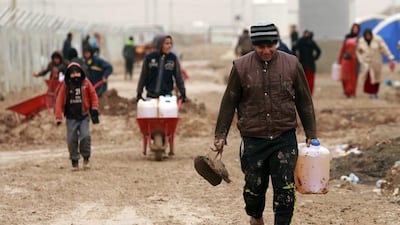KHAZIR, IRAQ // Mobile phones, cartons of cigarettes and fresh mutton are all on sale inside a camp for Iraqi civilians displaced in the battle to recapture Mosul – if they have the money.
In the Khazir camp, buyers trudge in the mud, examining improvised market stalls on the ground between tents that shelter thousands of people.
Behind his makeshift display of mobile phones and USB cables, 28-year-old Waad Khalaf grins. Buyers are permanently flocking to his stall, he says.
Under ISIL, “having a mobile meant prison so now everybody needs to buy one”, he says, his hands stuffed into the pockets of his fake leather jacket to warm them.
The former labourer escaped his home town of Gogjali on the outskirts of Mosul in northern Iraq in November as fighting raged there between Iraqi forces and ISIL fighters.
Selling phones for up to around 130,000 Iraqi dinars (Dh400) each allows him to buy warm winter clothes and shoes for his daughter and son, says the father of two.
Khalaf and his wife can then also afford to buy medicine from Erbil in Iraqi Kurdistan several dozen kilometres to the east.
Not far from the improvised market, Khalaf’s clients can charge their new phone by plugging it in to a multi-socket extension cord linked to a generator.
In a camp with just four hours of electricity a day, savvy young entrepreneurs are asking for the equivalent of around US$0.40 (Dh1.46) for an hour of power from the roaring machine.
Khalaf has only been selling his phones for three days but Farhan Yassin says he was one of the first salesmen at the improvised market.
It happened “just like that”, he says. “We never spoke to each other but somehow we all ended up here.”
For 12 days, Yassin has been selling cigarettes as a way of returning to normality after living under the extremists.
He lost his shop in Mosul after ISIL closed it down and made him pay the equivalent of around $1,300 for selling cigarettes, he says, which were just as sinful as mobile phones under their ultra-conservative rule.
He now sells each packet of cigarettes for around 500 dinars after buying them in bulk in Erbil.
Ammar, a barber, also left Mosul last month when anti-ISIL forces arrived at the gates of Iraq’s second city.
He was only able to smuggle a pair of scissors into his bag as he fled and had to buy all the rest of his equipment in Erbil.
Seating his clients in front of a mirror, he uses his new gear to trim their beards or snip their hair.
His customers “pay what they want as nobody has work”, he says, plastic comb in hand, bags of vegetables left behind on his small table as payment.
The 26-year-old history graduate was unable to work as a teacher under ISIL as the group set up its own schools, says the young man.
When he could not find work at a camp school either, he again resorted to his snipping skills to support his young daughter “who needs diapers and powder milk”.
Not far from where he cuts hair, powder milk is on sale next to sanitary pads, underwear, metal cutlery and fizzy drinks for those with money.
Cash is in rare supply among the roughly three million people displaced by fighting in Iraq.
But one couple has found a solution. They slip bags of rice and lentils they have received as aid through the fence surrounding the camp to people on the other side who buy them for a few precious bank notes.
* Agence France-Presse

